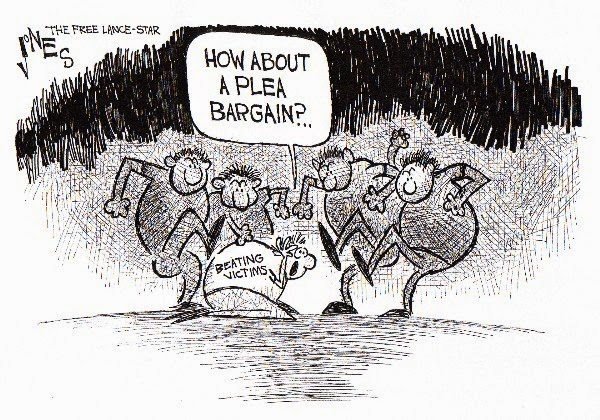PLEA-BARGAINING IN INDIA
A plea bargaining is an agreement in a criminal case in which a prosecutor and an accused arrange to settle the case against the accused. The defendant agrees to plead guilty or no contest in exchange for some concession from the prosecutor. Hence, it can be rightly said as a process in which the accused and the prosecutor in a case of criminal settle satisfactory disposition of the case subject to court’s approval.
PLEA-BARGAINING IN INDIA
Huge arrears of criminal cases are a common feature in almost all the criminal courts. It is in this background, the law commission felt that some remedial legislative measures to reduce the delays in the disposal of criminal trials and appeals and also to alleviate the suffering of under trials prisoner. The Law Commission in its 142nd Report on Concessional treatment of Offenders who on their own initiative choose to plead guilty without bargaining (1991) considered the question of introduction of the concept of concessional treatment for those who choose to plead guilty by way of plea-bargaining.
Criminal jurisprudence of India does not recognize the concept of “plea-bargaining” as such. Reference may, however be made to section 206(i) and section 206(3) of Code of criminal procedure and Section 208(1) of Motor Vehicles Act, 1988. Such provisions enables accused to plead guilty for petty offences and to pay small fines whereupon the case is closed. But there is no bargaining between the prosecutions on the one hand and the accused on the other hand.
The Law Commission (142nd report) was of the view that the plea bargaining made an essential component of administration of criminal Justice provided it is properly administered.
For that purpose, it had issued certain guidelines and procedure that have to be incorporated in the code of criminal procedure.
- Plea bargaining would not to apply to serious offences.
- Three more categories of offences have also been excluded, they are:
- those offences affecting socio-economic of the country.
- Offences committed against women.
- offences committed against children below the age of 14.
CASES:
Kachhia Patel Shantilal Koderlal v. State of Gujarat and Anr s
The apex court strongly disapproved the practice of plea bargain. It has held that practice of plea bargaining as illegal and unconstitutional and which tends to encourage corruption, collusion and pollute the pure fount of justice.
Kasambhai v. State of Gujarat
Similarly, in this case, Supreme Court had expressed its apprehension that such a provision is likely to be abused.
Muralidhar Meghraj Loya v. State of Maharastra
In this case, Justice Iyer’s apprehensions have been reflected. The offence in question was in relation to food adulteration which had widespread health ramifications. However, with the provisions of the Criminal Procedure Code, socio-economic offences are outside the purview of the plea bargaining. Further, it does not often imply that the accused will not be jailed. He will still be punished, and his reduced sentence cannot be lesser than 1/2 or 1/4 as the case may be.
APPLICABLITY OF PLEA-BARGAINING:
| LAWS WHERE PLEA-BARGAINING IS APPLICABLE | LAWS WHERE PLEA-BARGAINING IS NOT APPLICABLE |
| The Drugs and Cosmetics Act, 1940 | Section 115, 119, 302, 304, 304-B, 305,
307, 498, 498A of Indian Penal Code |
| The Representation of people Act, 1951 | The Explosives Act, 1884 |
| The Negotiable Instrument Act, 1881 | The Immoral Traffic (Prevention) Act, 1956 |
| The Prevention of corruption Act, 1988 | The Commission of Sati Prevention Act, 1987 |
| Criminal Law (Amendment) Act, 1957 | Dowry Prohibition Act 1961 |
| The Arms Act, 1959 | |
| The Essential Commodities Act, 1955 | |
| The Electricity Act, 2003 |
DIFFERENTIATING PLEA BARGAINING IN INDIA FROM USA:
| Grounds | Indian Model of Plea-Bargaining | American Model of Plea-Bargaining |
| Limitation on the kind of offences | Indian law implies that the victim has an active say in the bargaining proceedings, and may refuse or veto an unsatisfactory resolution. | in U.S.A, there is no restriction or limitation on the kind of offences for which plea bargaining can be applied. It may be applied for even in offences that carry a sentence of death penalty or life imprisonment. |
| Filing of Application | The onus is on the defendant to file an application for plea bargaining. | An application for plea bargaining is filed only after negotiations between the accused and the prosecutor is over. |
| Voluntariness of the application | There is a provision for the court to ascertain the voluntariness of the application. | No such provision. |





